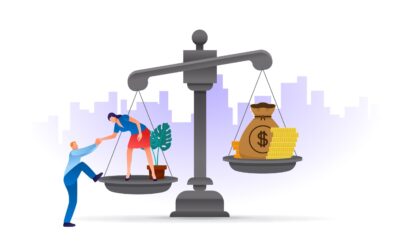Managing debt is a crucial aspect of financial planning. As a CPA with years of experience, I understand the importance of balancing debt payments with other financial goals. Paying off debt is a critical component of financial health, but planning and saving for other financial goals like retirement is also essential. In this blog, I’ll share my insights and strategies for managing debt effectively while saving for the future.
One of the most critical strategies for managing debt effectively is prioritizing and strategizing. When it comes to paying off debt, it’s important to have a plan of action. Do you pay off the high-interest or the lower-interest ones first? Do you focus on one at a time or do them each in installments? In the coming paragraphs, I will help you manage your debts– let’s jump right in.
Strategy 1: Prioritize High-Interest Debt
One of the first strategies to manage debt is to prioritize high-interest debt. High-interest debt, such as credit card debt, can quickly become a financial burden if left unmanaged. Start by paying off debt with the highest interest rate first, while making minimum payments on other debts. This will help reduce the overall amount of interest paid overtime, and also give a sense of accomplishment as each debt is paid off.
In rare circumstances, where there is multiple lower rate debt it can be more efficient to quickly pay off the lower ones – which in cumulative may be charging more interest than an individual higher debt – so we need to analyze to pay off the debt strategically!
Strategy 2: Consolidate Debt
Consolidating debt can also be an effective strategy for managing debt. This involves taking out a loan to pay off multiple debts, leaving only one monthly payment to manage. Consolidation can help simplify debt management and potentially reduce interest rates, leading to lower monthly payments.
Strategy 3: Create a Budget and Stick to It
Creating a budget is a fundamental aspect of financial planning. Understanding where money is being spent and appropriately allocating funds is essential. Individuals and businesses can prioritize debt payments while saving for other financial goals by creating a budget and sticking to it.
Saving for Retirement: Why It Matters
As an investment advisor, I have seen how important it is to plan for retirement. Retirement planning can seem overwhelming, especially when you have other financial obligations, but starting early is crucial. By saving early, you give your money more time to grow and compound, which means you’ll have more money available when you’re ready to retire.
One of the biggest mistakes people make is not setting clear retirement goals. Without goals, knowing how much you need to save and how you should invest your money is challenging. I recommend setting specific goals for retirement, such as the age you want to retire, the lifestyle you want to have, and the amount of money you’ll need to support yourself in retirement.
Another strategy is contributing to retirement accounts, such as a 401(k), IRA, or RRSP, depending on your country of residence. These accounts allow your money to grow tax-free or tax-deferred, which can help you save more in the long run. You should aim to contribute as much as possible to these accounts, especially if your employer offers a matching contribution.
Finally, it’s essential to create a retirement income plan. This plan should outline how you’ll withdraw money from your retirement accounts and other sources of income to support yourself in retirement. By creating a plan early on, you’ll have a better idea of how much you need to save and how your investments should be allocated.
In summary, saving for retirement is crucial, and there are strategies you can use to balance debt payments with retirement savings. By setting clear retirement goals, contributing to retirement accounts, and creating a retirement income plan, you can ensure a comfortable retirement without sacrificing your current financial health.
Importance of an Emergency Fund
Another important aspect of financial planning is having an emergency fund. Unexpected expenses can arise anytime, and having an emergency fund can provide a safety net to help you cover these expenses without relying on debt. As a CPA and advisor, I highly recommend having an emergency fund in place, regardless of your financial situation. This section will discuss why an emergency fund is essential, how to build one, and how to determine the appropriate amount to save.
I hope these sections provide you with valuable insights on how to balance your debt payments with your financial goals. Continuing with the discussion of financial goals, let’s focus on setting up an emergency fund. Let’s dive in!
Having an emergency fund is crucial for financial stability and security. I have seen firsthand how unexpected expenses can cause financial stress and lead to increased debt, both in businesses and personal lives. An emergency fund can help prevent this by providing a cushion for unexpected expenses such as medical bills, car repairs, or job loss.
Building an emergency fund is an essential step in financial planning, and it’s crucial to establish as soon as possible. One strategy is to set a savings goal for your emergency fund, such as three to six months’ worth of living expenses. This may seem large, but starting with small contributions can help build up the fund over time. A great way to start is to transfer money into the account every pay automatically. This can be set up with most banking institutions.
Determining the appropriate amount to save for an emergency fund can depend on factors such as your income, expenses, and job stability. It’s essential to consider your personal situation and tailor your emergency fund accordingly. For example, if you have a stable job and a reliable source of income, you may be able to save less than someone who is self-employed or has an inconsistent income.
In summary, having an emergency fund is a crucial aspect of financial planning that can help provide stability and security in the face of unexpected expenses. By setting a savings goal and determining the appropriate amount to save based on your personal situation, you can build a strong emergency fund to help manage your debt while still saving for future financial goals.











